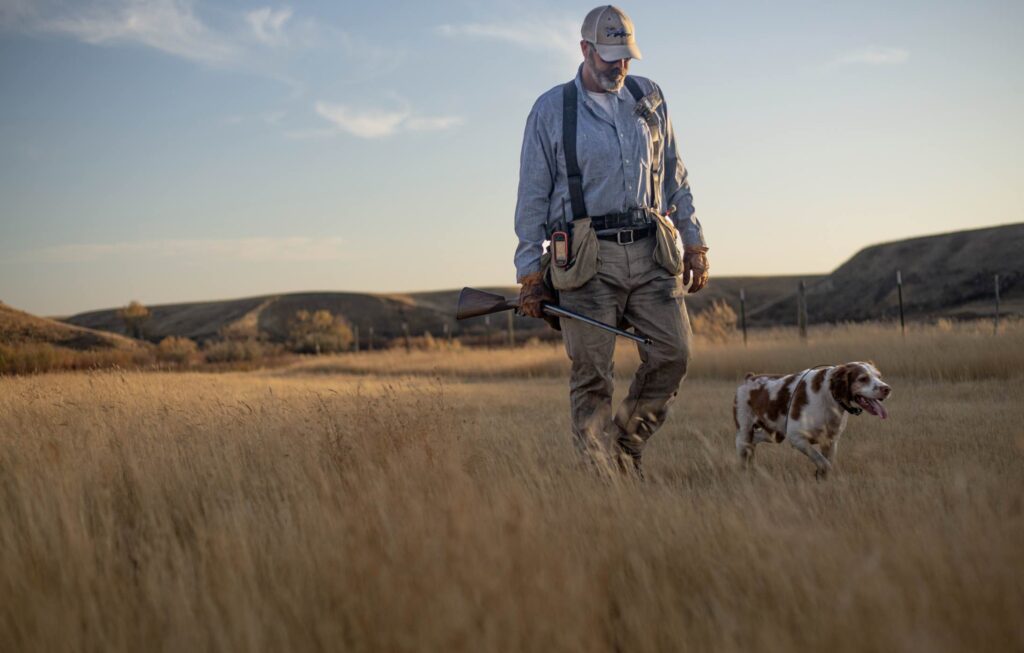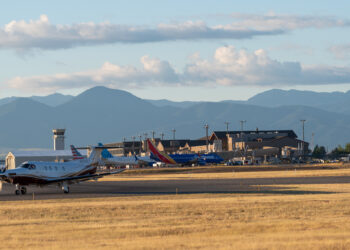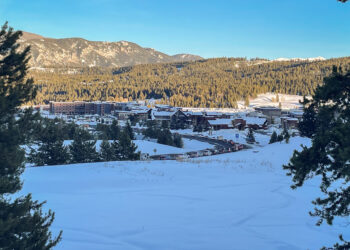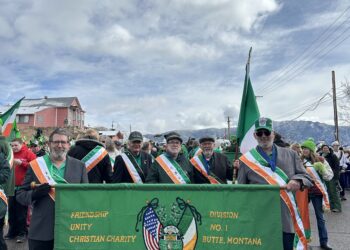By Jen Clancey DIGITAL PRODUCER
On Sept. 14, Ryan Busse entered the Montana gubernatorial race as a Kalispell Democrat. Busse, a former firearms executive and campaign adviser for President Joe Biden, announced in a campaign video, “My Montana is a place where hardworking people make a living for themselves [and] raise their kids with equal opportunities.”
The video included his familly, two of which have been placed in the national conversation as plaintiffs in the historic youth climate trial, Held v. Montana.
Explore Big Sky spoke with Busse to learn more about his gubernatorial race and how he would lead the state.
Explore Big Sky: So, what do you think is special about Montana?
Ryan Busse: Oh, boy.
So a bit of a story: When I was a young boy my father would often tell me stories about a trip that he took to Montana in 1964. Those were literally my bedtime stories. He had some friends when he was in college and [he] toured through the state, you know, slept on the bank of the Jefferson [River] and heard elk bugle and all this stuff. So these were my bedtime stories about how magical Montana was.
I then spent a good part of my early years up until I was about 20 just dreaming about Montana and figuring out how I could get here. And I did. In 1995, I moved here. Since then, I can’t even count the ways in which Montana has made me better. It’s really exceeded what I thought a dream could be. That started for me in the Badger-Two Medicine, a place that I consider very sacred, and then has expanded to so many other parts of the state from a natural standpoint, and the people, amazing people, and friends that we have in Kalispell. We’ve lived there now for almost 30 years and raised our family there and have friends all across the state in Missoula, and Bozeman and Havre. And so, I just love the place.
EBS: That’s awesome. So Two Medicine, that’s a place that’s really important to you.
RB: The Badger-Two Medicine, it’s important enough that we named our second son Badge after the Badger-Two Medicine.
EBS: So you’re running for Montana governor, what do you think is unique about this upcoming race?
RB: I think we’re in the middle of an existential crisis in Montana. I’m very fearful of what the current administration is trying to turn this place into. It’s making it very difficult for working people. It’s upending the sort of backbone that I consider essential to Montana. It’s weakening our public schools, definitely threatening to weaken or amend our constitution or 1972 constitution. And in a weird, creepy way going after freedoms, like women’s health care freedoms. The sort of intrusion into people’s personal lives is something that is not in any way part of the Montana that I think of as special.
We are faced with a choice of are we going to allow those things to happen? Are we going to be like some repressive state that isn’t special, isn’t the Last Best Place? Or are we going to be the Last Best Place? I think it’s time to choose.
EBS: So I think you’ve touched upon this a little bit, but what decisions has the Montana legislature made that really disappointed you?
RB: Look, for the most part—not to say there weren’t a few good things, and I’ll get to those—but many of the things that came out of the state legislature this last session, and the sort of vitriol that came out of it was an embarrassment. It was an embarrassment nationally.
The few good things that did pass, I’ll give you an example, like Senate Bill 442, which was a bill that was passed with overwhelming Republican support. Then [Gov. Greg] Gianforte vetoes that, and it’s a conservation bill and it funds maintenance of rural roads and so the stuff that came out, he vetoed.

EBS: So from what I understand some of those key issues that you’re looking to address as governor are housing, gun control, public school funding and environmental conservation. Is that correct?
RB: Yes. So I’m not really unconcerned about radicalization in and around guns, but I’m not proposing or running on any gun control issues.
I’m very worried about housing affordability. I think that tax– the way that the legislature took a $2.8 billion surplus and instantly spent it by basically giving away tax breaks to big corporations and wealthy people and then shifting the tax burden and settling every single homeowner in the state of Montana with a great big tax increase–I think that’s just sort of part and parcel about how disdainful this bunch is about working Montanans and average Montanans.
So the tax thing is a central topic, because I think it’s very illustrative about how detached they are from Montana.
EBS: According to data from a recent U.S. Census [Bureau report], 29% of households in Montana will spend more than 30% of their income on housing costs. Readers of Explore Big Sky would be really interested to learn about how you plan to tackle that issue. In Big Sky’s experience, we have issues with housing for the essential workforce and there’s similar challenges in Bozeman.
RB: I think that the property tax issue is very illustrative. The first thing that the government and the governor need to do is stop making things worse. And this tax policy that they heaped on us has made it way worse. Only about half of the homes qualify for this little one-time rebate that they’re trying to shut everybody up with, whereas property taxes or permits are going to keep going up.
If the home was a rental home, it doesn’t qualify for any tax rebate, meaning that the tax increase is going to hit renters right in the pocketbook. It’s going to make this affordability thing way worse. It’s going to drive up rental rates even more. And so in the middle of a very tight, if not near crisis, market for almost every working person, what does the Gianforte administration and the Republican supermajority do? They make it worse, way worse. If nothing else, we’ve got to stop doing that.
EBS: Montana is struggling to retain teachers. More than 50% of newly licensed Montana teachers will leave their jobs in the first three years. Can you tell me a little bit more about how you plan to tackle those vacancies and provide stellar education to kids in Montana who go to public schools?
RB: I grew up outside of a little town of 640 people, graduated with 16 other kids. All of us had the opportunity to attend some kind of secondary education… We all had great opportunities because of that. It was strictly due to our public education system in small towns.
And now we have the Gianforte administration doing everything it can to weaken and privatize that public education system. That is stressing our schools, our teachers. Our [entry-level] teachers are the lowest paid in the country. We have a $2.8 billion surplus and we still have the lowest paid teachers in the nation. That tells you all you need to know about how this administration values public education, and I place exactly the opposite value on it. I think it’s central to our democracy and to the opportunity of our kids and I’m prioritizing it.
EBS: Absolutely. So we touched briefly upon gun control. You said that you’re not running on any specific gun control plans or policies at the moment.
RB: That’s correct. I’m worried about radicalization. I’ve worked in the firearms industry for 25 years and I think the irresponsibility we’ve seen in and around the [Second Amendment] is very dangerous. I think it’s largely a social norm thing and I think that responsible gun owners like me should lead by example and stand up and decry some of the irresponsible acts we’ve seen. But I’m not in favor, nor am I proposing any kind of massive legislation. I’m basically calling on responsible gun owners to help us tamp down the irresponsible actions that we’ve seen.
EBS: What does the future of gun control for you in Montana look like?
RB: I don’t want it to be restrictive. And I think that means that if we’re going to have a powerful right like the 2nd Amendment, which I appreciate and which I engage in. I was hunting a couple days ago, and hope to be hunting again soon. I own lots of guns and believe in defending myself. But we’re going to lose all of our rights eventually if we let democracy come apart, because radicalized people abuse [rights].
It’s incumbent on responsible gun owners to stand up and make sure that doesn’t happen. We’re the ones that care about maintaining our rights. And, frankly, that’s the way to save our 2nd Amendment gun rights– it’s to be the responsible ones that protect them.

Listen: Hoary Marmot podcast hosts Joe and Michelle Borden chat with Ryan Busse in a recent interview about his campaign.
EBS: As for your past experience, maybe you could tell me about how working as an adviser to the Biden administration’s 2020 campaign motivated you to shape the future of Montana?
RB: I’ve been an advisor to lots of groups, including the Biden campaign. As with a lot of things, there were a lot of good things that I learned… and there are some frustrating things. Generally speaking… I don’t think [coastal Democrats] quite connect with the kind of rural culture that I grew up in, and the sorts of things that are often important to Montanans. And despite being proud of working on that campaign, I also had the frustrations of not always being heard.
Understanding that rural issues could be messaged to and people could be messaged to and met in a little better way. And that’s part of what being a good adviser is about. So I enjoy the process, but it’s not…. like I’m an uncritical fanboy. I try to be constructive and stand up for Montana folks. That’s what I was there for.
“I don’t ask anybody to do anything that I wouldn’t do myself ever. That’s part of growing up on a ranch—everything is your job… there’s no rank, you just pitch in and do it.”
EBS: So a lot of the time you were kind of speaking for rural communities more because you have experience with that?
RB: Not a lot of time—all the time.
EBS: Where have you spoken on your campaign?
RB: I spoke at Rocky Mountain College [in Billings] last night. I was in Helena at an event [the night before]; really awesome, packed house—unbelievably energetic event. I was in Butte the night before that.
I guess the theme here is that I’ve been shocked and touched and heartened about the outpouring of support and the energy that is around the campaign. I’m still worried and frightened about what the stage is going to be if we don’t stand up and fix it, but a lot of people share my worries and they’re excited about what might happen here.
EBS: Since we’re around one-year out, can you tell me about what your plan looks like before the election?
RB: One-hundred miles an hour. Meeting everybody in every corner of the state as fast as I can. I’m not shying away from any question or controversy or person…I want to meet everybody, and we plan on doing that. Speaking where I can and meeting people where they are, and making the case for why we need to make a change in the state. And I think people understand that.
EBS: I’m really curious to learn your leadership style. Maybe you can tell me about how you plan to lead Montana and what style of leadership you usually take on?
RB: Well, everywhere I’ve been in whatever role I’ve been in, I’ve always had really a lead by example, and an open door policy. Everybody on my team is brought in. They believe in the larger mission. They believe in the importance of what we’re doing. I don’t ask anybody to do anything that I wouldn’t do myself ever. That’s part of growing up on a ranch—everything is your job… there’s no rank, you just pitch in and do it.
My leadership style would be that I would be proud and happy and thrilled to lead the government in the Last Best Place. And I’m not really sure we have a governor right now who’s very happy to do it and it doesn’t look to me like he’s having much fun being the governor… but it’s really important that it should be pretty damn fun to be the governor of Montana.
EBS: Thank you so much for finding some time, Ryan. We wish you the best on your next campaign stops.
RB: We’ll see you in Big Sky [soon]. You guys take care.













